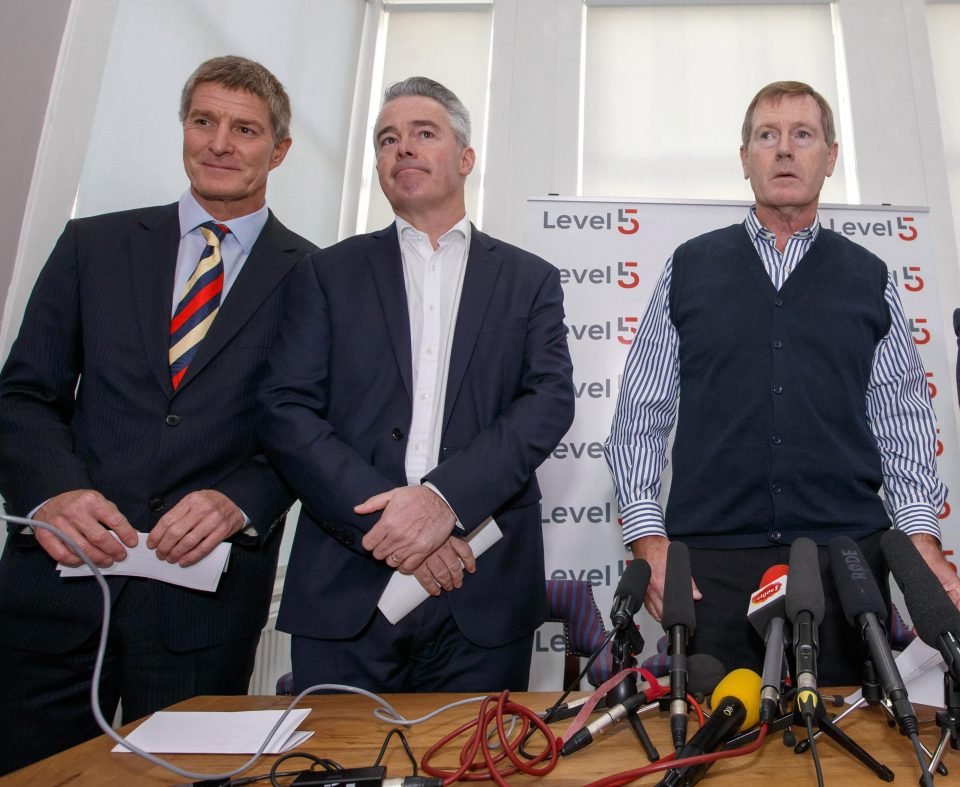I never write about the English based media unless I’m talking about the TV deal down there, or keeping tabs on idiots like the one who writes for The Daily Star and who I mentioned in a piece last week. The newspapers I read for pleasure, for actual news, are based there and staffed by serious professionals, especially The Guardian, who’s football coverage is almost uniformly brilliant and who’s writers are insightful and hugely entertaining to read.
I have always been troubled by how little attention they pay to the game here.
Their Scottish football staff writer, Ewan Murray, can be monumentally frustrating to read at times and at others offers analysis which beats those who work on titles here hands down. His article on the McLeish appointment is typical of both of these traits; it is well written, pours scorn on the association for the decision, describing it as lacking foresight and stemming from “blind panic”. Yet it misses so much that ought to be in there.
It describes McLeish as a decent man, and he might well be in terms of how well he comes across to the media and in social gatherings. But he is also a tax cheat, and presided over an era at Rangers which was nothing short of disgraceful.
As an EBT recipient he knew what was going on at that club.
The financial doping happened on his watch.
Murray’s lack of scrutiny of what McLeish and others there were involved in is emblematic of the problem we have here; if he doesn’t treat that era seriously how can we expect anyone down there to? But they should. Because the McLeish story shines a light on an association that cannot shake its past, because it has never properly faced up to it.
Scottish football is run by men who have no business sitting at the top of any organisation.
What they, and their predecessors, allowed to happen these last six years has been an outrage which any decent person would condemn.
And I am convinced the sports following public south of the border either knowns none of it or a distorted version of it.
But there is a monumental story here, if anyone down there wants to look into it. There is a story that would shock their readers down there every bit as much as they have horrified, and continue to horrify, those of us who live up here.
If anyone down there wants to have a look at it, I can suggest some places where they can start, some issues they should take a peek at and which offer them a glimpse into the dark corners up here. They might just be interested in what they find.
I am a Celtic blogger, which means I’m wholly partisan on these matters.
But serious journalists should know that there’s a serious situation here … and give these issues a look for themselves.
The Biggest Club In Scotland Is Concerned Enough To Have Asked For An Inquiry Into The SFA.
Is Scottish football’s corruption scandal real?
That’s the first question that any enterprising journalist would have to ask before they even started to look in to it.
And the answer to that question is obvious; it’s real enough that Celtic, the biggest club in the country by far, wanted an official inquiry commissioned into what was going on at the SFA during the period when Rangers was using EBT’s and in the 12 months plus from Craig Whyte’s takeover of that club to the moment Charles Green’s Sevco got its license and league place.
Celtic is grievously concerned by these matters.
Other clubs express their disquiet in private.
Some are too afraid of outside pressure – from Sevco fans and from criticism from the press.
The nature of debate in the game here is worth looking at on its own, because Celtic approached this matter through the avenue of the SPFL, who’s board supported an inquiry claim only for the SFA to over-rule the clubs and their wishes.
Not one of the clubs who supported Celtic’s stance spoke up in public about it. Not one.
That should alert anyone interested as to the climate of fear that surrounds this issue.
Two senior clubs, Aberdeen and Hibs, immediately released statements saying they did not support us. That made a lot of people suspicious. The supporters of both clubs have been vocal critics of the SFA over these matters and are solidly behind an inquiry.
Something stronger than fan pressure was influencing this.
Aberdeen was facing local authority pressure over the new stadium proposals; rumours continue to be rife that it was brought to bear over this issue. Hibs’ chairman Rob Petrie wants to be next in the SFA hot-seat and was instrumental in the McLeish decision which was announced today. Both clubs were later handed a Scotland international apiece, a rare occasion when the SFA allows a match to be played outside of Hampden.
The SFA does not want an inquiry into those events; a lot of us have spent years investigating this and we can wholly understand why.
Resolution 12: The Questions The SFA Don’t Want To Have To Answer (Or Ask).
Enough has been written about Resolution 12 that anyone in the English media who wanted to could find out the basics in a few minutes, with a mere internet search. The story has been rolling on for the last few years, and every layer reveals more worrying stuff.
The basics are simple; in 2011, Rangers was allowed to play Champions League football although there were serious doubts over their eligibility for a European competition license. The club that was later liquidated over the with-holding of tax had a “liability payable” with HMRC when the licensing process was underway. The SFA says they followed procedure; Celtic disagrees. The SFA says that the club was compliant; Celtic does not believe that.
People inside Celtic believe that either Rangers with-held crucial information from the governing body, and that the SFA did not do enough to chase that information, or that the SFA knew the club did not meet the criteria but looked the other way.
It is one of the key issues Celtic wanted investigated via the inquiry we called for.
Celtic Football Club has been pursuing this information for a while.
A group of fans called The Requisitioners has been chasing it just as long.
The story came to prominence when they raised it at a Celtic AGM – they are shareholders, and wanted to know if our club had been deprived of £20 million plus in revenues as a result of that decision.
At the time of writing, the SFA has bowed to pressure from Celtic and opened a disciplinary investigation over the issue. But the club who committed those offences no longer exists and our club believes this will be a whitewash. Inside Celtic Park there is a growing suspicion that the SFA are willing to go through the sham investigation to hide their own involvement in this.
Who knows where this one will end up, but Celtic is prepared to push it all the way, wherever that leads and whoever it implicates.
It is a massive scandal and well worth a journalist’s time.
The Lord Nimmo Smith Fiasco: With-Held Evidence And A Ridiculously Limited Remit.
The two governing bodies in Scottish football, the SPL and the SFA, agreed to hold a previous inquiry into the Rangers EBT era; it was led by Lord Nimmo Smith. The final verdict astonished and appalled people; Rangers had deliberately operated a tax scam, and in doing so withheld information about player contracts from the SFA – an offence which should have rendered each and every match which involved the players concerned ruled null and void.
It would have resulted in more than a dozen trophies being stripped from the record, like happens in other sports where cheating has been established.
Nimmo Smith did not pass that sentence.
Instead he fined the NewCo (who had played no part in the scandal) a trifling sum and left every result and title stand. His rationale was that a decade of tax fraud, which allowed the club to sign dozens of players they otherwise could not have afforded, had conferred “no sporting advantage” to the club.
Read that again; in a game where money allows some clubs to move so far ahead of the rest that you can barely see them in the distance, a senior law lord concluded that a tax scam which let one team amass an expensive squad had not given them an edge over other teams.
The rationale behind that is amongst the most loathsome ever proposed by a legal official; that every other club in the country could have operated the same scheme, but chose not to. It’s like saying that someone bringing a knife fight to a boxing match is simply thinking on their feet and that the loser (i.e. the guy without the knife) should have armed himself.
In addition to this, when the tax case against the OldCo reached the Supreme Court last year evidence was presented which contradicted some of what Nimmo Smith had ruled on, and it became clear that further facts had been with-held from him altogether. He also failed to take into account that the EBT scheme involved two wholly separate tax scams … and one of them had already been ruled illegal by the time the case was heard.
Folding one tax case into another, and restricting the time-frame under investigation, also, conveniently, allowed the SFA President Campbell Ogilvie to escape proper scrutiny; he had been a senior official at Ibrox during the EBT era … and his was the very first signature on the very first document which opened that scam in the first place.
The size of this can only be imagined by those without the full picture.
The SFA Official Who Told Nimmo Smith That Rule Breaking Was Legit If No-One Knew About It.
On the surface of it, the SFA played no role in the Nimmo Smith investigation; LNS was run by the SPFL, with the SFA as the “final court of appeal” in case people didn’t like the decision. Those who say that LNS was the “final word” often like to ignore that the SFA was set to sit in judgement of it if there was some disagreement over the verdict.
But the SFA was, of course, involved in the case.
Its officials gave evidence.
It protected its own President from proper scrutiny during the case.
It helped to set the remit for the investigation itself.
And one of its officials offered perhaps the most scandalous interpretation of football rules and regulations that has ever been heard, anywhere.
No-one has ever explained how the SFA could have played a role as an appellate body when they presented evidence in the case … it makes no sense unless you look at the evidence they put up. Then you understand that these people were leaving nothing to chance.
Sandy Bryson, the association’s registrations officer, said that the “dual contracts” held by the club were a violation of the rules … but that this didn’t matter because at the time when the games were being played no-one knew that.
This might well be the most corrupt part of this whole affair; the notion that if no-one knows a crime is being committed except for the criminal that there’s no case to answer when the crime and the evidence that proves it is later discovered.
Bryson’s Law came down to this; the players were registered and that registration was deemed to be valid because nobody knew that the registration was improper at the time. Anyone who wants to examine this issue should need no other convincing that this whole thing stinks. That a senior official at a football association would make such a claim is incredible.
That it was accepted by LNS is mind-boggling.
Sandy Bryson has previous for this. Back in the 90’s when Celtic pursued then SFA President Jim Farry over the association’s failure to properly process the registration of the Portuguese striker Jorge Cadete – a decision which potentially cost us a league title and for which Farry was later fired – Bryson had been in the same role. He was clearly involved in Farry’s decision not to register our footballer, but Fergus settled for the scalp of the President and never pursued it to its conclusion.
It is clear that he should have.
It is clear that Bryson is worth scrutiny.
The Outside Agency Who Raised These Issues … And Who The Scottish Press Ignored.
The Tax Justice Network is a well known independent organisation, who’s stories frequently make it onto the front pages of national newspapers.
Their off-shoot organisation, The Offshore Game, which was set up to examine issues within football and in particular foreign ownership of clubs, are equally respected.
They have no axe to grind.
In May 2016, they released an astounding report on these issues called Doing SFA For Fair Play?
In that report, they smashed the SFA’s credibility and they brought this story to an audience that had never read the full facts and the response was instant. And venomous.
Threats were issued. Counter articles were quickly rushed into print, mostly focussing on minor errors, others on the backgrounds of the writers and the TJN itself. One conspiracy theorist tried to prove links between Celtic officials and the authors of the report.
And although it was an independent agency offering a damning verdict on football governance in Scotland and labelling serious accusations at the SFA … the Scottish press treated the story as if it had never existed. Not one newspaper covered it objectively, based on the facts.
Indeed, the only mention of it up here was in articles which sought to do a hatchet job on those who had commissioned it. One newspaper allowed a Sevco fan blogger to write a piece accusing its writers of having an agenda against their club … a ludicrous notion.
The Offshore Game report is well worth reading.
It offers a superb overview of these matters and contains enough verifiable information to get people digging.
But more importantly, the Scottish media’s silence on the matter constitutes a story in itself, one about how PR firms hold unhealthy influence over our press and how one football club and its supporters can intimidate writers and broadcasters.
No joke.
All of this happens here.
Right here in Scotland.
A PR Firm With An Unhealthy Hold On Our National Game.
Level 5 PR was set up by a former Scottish journalist Jim Traynor. He was a well-known tabloid hack, who’s final column – a venomous, vindictive, hateful piece in which he lashed out at colleagues, fans and officials in the game for what he perceived as a bias against Rangers – was one of the most extraordinary and vicious ever published by a national newspaper.
He went on to work for the club as its media head.
When that gig ended he set up the PR firm, and immediately went to work. One of his key clients is Sevco chairman Dave King, the South African convicted tax cheat who the SFA granted fit and proper person status in spite of his guilty plea. Since taking over the club he has instigated legal fights with sponsors, kit manufacturers and suppliers. In every instance Level 5 has provided the media with information that has turned out to be palpably false.
King is also involved in a legal dispute with the City of London regulators at The Takeover Panel, who have found him guilty of acting in a “concert party” with other officials in acquiring a controlling interest in the club. The Takeover Panel investigated that, ruled on it, King appealed and lost and then defied their instructions to make an offer for the club’s remaining shares. The Takeover Panel sought an enforcement order which King continues to defy.
The Scottish media talks about “appeals” and “discussions” with the Takeover Panel constantly, when they’ve already given a verdict. King is in open defiance of their legally binding instruction, yet our media is constantly steered towards the view that this is a minor matter in which he insists he did nothing wrong. This is but a taste of Level 5’s influence.
Amongst those they represent are Walter Smith and Alex McLeish, the two men who were immediately linked with the vacant Scotland post when Michael O’Neill turned it down. There has been virtually no scrutiny of McLeish’s EBT and no mention at all is ever made in the mainstream press of the one Walter Smith had, a story in itself.
They also handle PR for Ladbrokes in Scotland; Ladbrokes are the official league sponsor of the SPL. Media events involving them have been used to push negative stories about Celtic and other clubs.
Level 5’s PR strategy at Ibrox has been relentlessly vicious; during their PR mop-up in the aftermath of the Scottish Cup Final of two years ago they defended the rights of the club’s supporters to invade the pitch and attack rival fans. They have released a number of inflammatory missives which alleged conspiracies against the club and issued open threats.
The SFA has steadfastly refused to open disciplinary proceedings against them for bringing the game into disrepute. The same SFA who punishes any player or manager who speaks out against refereeing decisions and once sanctioned a Celtic player for singing a song.
Anyone who looks into Level 5 will find plenty to astound them.
And all of this is the tip of the iceberg ….
Scottish football is corrupt, and run by corrupt people. It’s a fact. And it deserves more scrutiny in the national press than it gets.






